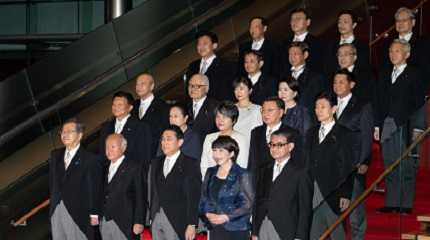
TOKYO, Sept. 13 (Xinhua) -- Japanese Prime Minister Fumio Kishida on Wednesday revamped his cabinet and the executive lineup of the ruling Liberal Democratic Party (LDP) as public support for the government is waning.
The second cabinet reshuffle by Kishida since last year included changes to 13 out of 19 ministers, with 11 of them entering the cabinet for the first time.
According to the lineup, Finance Minister Shunichi Suzuki, Chief Cabinet Secretary Hirokazu Matsuno and Industry Minister Yasutoshi Nishimura, among six current cabinet members, remained in their posts, as Kishida seeks to maintain stability in key positions.
Digital minister Taro Kono, economic security minister Sanae Takaichi and transport minister Tetsuo Saito who is a member of the Komeito Party, also stayed in their posts.
Notably, the number of female cabinet members jumped to a record five from two, with former Justice Minister Yoko Kamikawa, a veteran female lawmaker, named foreign minister to replace Yoshimasa Hayashi.
Analysts here suggested that Kishida's freshening-up moves are to showcase his commitment to gender equality reforms, which may help boost the cabinet's approval ratings.
The average age of the new cabinet members came in at 63.5 years old, up from 62.7 seen in the last reshuffle, statistics showed, and the number of cabinet ministers from the Senate increased from one to three.
Among the new faces, Minoru Kihara took the defense portfolio. Keizo Takemi and Shinako Tsuchiya were appointed health minister and reconstruction minister, respectively. Ichiro Miyashita replaced Tetsuro Nomura as minister of Agriculture, Forestry and Fisheries.
The reshuffle came as support rates for Kishida's cabinet have continued to slide and in August almost hit the lowest level since he took office in October 2021, amid raging public frustration over the "My Number" national identification card system and soaring prices in the absence of salary hikes.
It is also seen as an opportunity for Kishida to solidify and maintain his political support within the LDP as he prepares for the party's presidential election scheduled for September next year.
However, experts here noted that it remains unclear whether the reshuffle will prove successful in increasing support for Kishida's cabinet, because the choice of important figures retained, and power dynamics in the new structure might fail to attract much public attention.
"Kishida's unimpressive cabinet reshuffle is unlikely to boost his popularity, preventing him from dissolving the lower house for a snap election soon to solidify his political base," national news agency Kyodo reported Wednesday.
Kishida may face difficulties in determining the optimal timing for the lower house dissolution before the scheduled LDP presidential race, as factors that could lead to the restoration of trust in his cabinet are limited, it added.
For the other posts in the prime minister's new cabinet, Junji Suzuki was appointed internal affairs and communications minister and Ryuji Koizumi was named as justice minister. Masahito Moriyama and Shintaro Ito serve as education minster and environment minister, respectively.
Yoshifumi Matsumura was appointed chairperson of the National Public Safety Commission while Yoshitaka Shindo serves as minister in charge of economic revitalization.
Two females, Hanako Jimi, 47, and Ayuko Kato, 44, were respectively newly appointed as regional revitalization minister and child policy minister, with the latter being the youngest member of the reshuffled cabinet.
The reshuffled cabinet will be formally inaugurated with an attestation ceremony at the Imperial Palace on Wednesday evening.
Earlier in the day, Kishida as LDP head also changed the ruling party's leadership.
Regarding the LDP's four key party executives, Toshimitsu Motegi and Koichi Hagiuda were retained as secretary general and policy chief, respectively. Yuko Obuchi, the 49-year-old daughter of late Prime Minister Keizo Obuchi, was appointed as election campaign chief, replacing Hiroshi Moriyama, who became chief of the general council.




